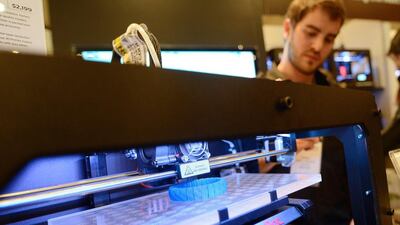3D printing is set to go mainstream across the globe over the next few years, but it will take a little longer in the Middle East.
According to research from the International Data Corporation (IDC) the worldwide 3D printer market will grow at compound annual growth rate of 59 per cent from 2012 to 2017 in terms of units shipped and 29 per cent in terms of revenue.
“It is something we have been talking about recently and the potential is there, but we have to wait and watch the approach in the region,” said Ashwin Venkatchari, the senior program manager, imaging devices and document solutions at IDC Middle East and Africa. “It is too early and one of the reasons is that this region is predominantly transactional. Places like the US and China are driving this growth, in those markets you have a fair level of local consumption happening, but in this part of the world [the market] still has not reached that level of maturity.”
One company poised to tap into the potential growth of 3D printers is Dubai-based Jacky’s Business Solutions, part of Jacky’s Electronics.
The company is supplying printers at prices from $10,000 to $350,000. It is pinning its hopes on the resurgence of the construction sector in the region to shift these devices.
“We’ve been in the printing business for a while, typically on large format printing and billboard printers. Now we’ve gone into 3D printing which is a fairly different segment,” said Ashish Panjabi, the chief operating officer at Jacky’s. “Currently, a lot of designing work is being conducted on 3D but most of the models are printed outside the country.”
3D printing enables small businesses and individuals to “print” objects be it dental moulds, or spare parts for the bathroom but the process is a slow one – it takes six to seven hours to print one business card holder for example.
There are only a handful of 3D printer suppliers in the region. The Middle East’s first 3D printing shop was opened in Beirut earlier this year and similar concepts are likely to pop up in the near future where customers interested in printing their own designs but do not have the means to afford the printers themselves can go and see their creations and designs come to life.
“It needs a lot of education and we need to tell people what it’s about,” said Mr Panjabi. “The applications are endless, you’re talking about 100 different industry verticals. We are targeting industries where people have 3D content available, like the education sector and architects.” .
According to figures from the Consumer Electronics Association, about 63,000 consumer-use 3D printers were soldthis year, of which more than 40,000 ended up in the United States. The association expects sales of 3D printers to reach 91,000 units in 2014.
thamid@thenational.ae

